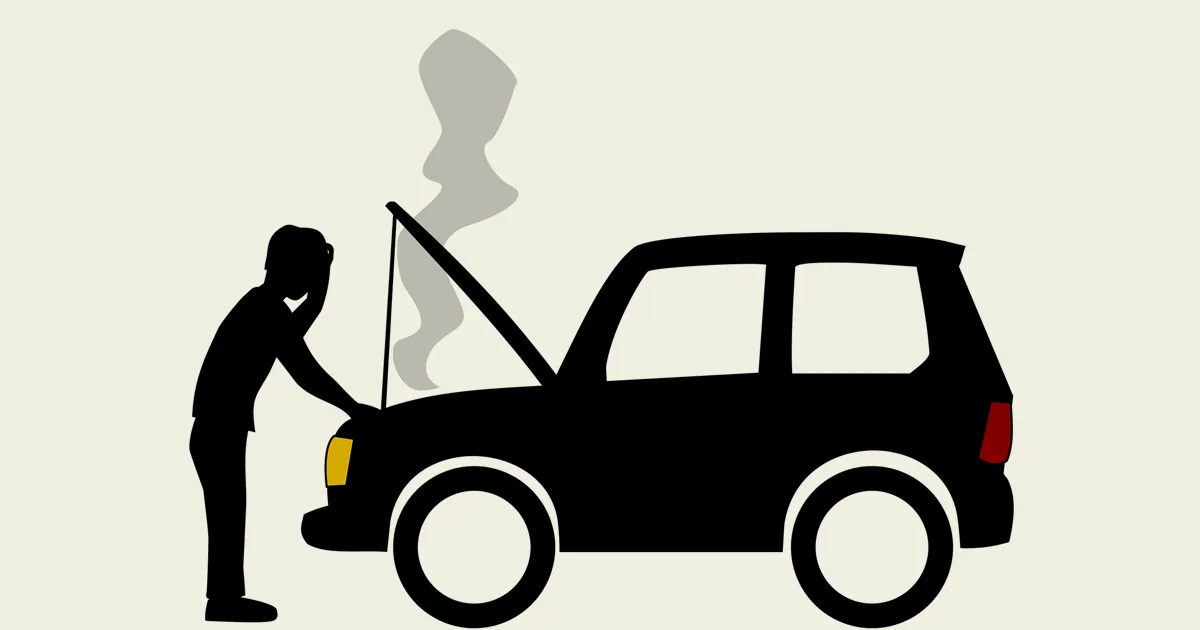Why Do Cars Overheat?: A car can overheat for a variety of reasons. One of the most common causes is a malfunctioning radiator. By moving coolant through the engine block, the radiator is in charge of keeping the engine cool.
Why Do Cars Overheat? 5 Main Reasons
If the radiator is clogged
If the radiator is clogged or not functioning perfectly, the coolant cannot circulate properly, and the engine will begin to overheat. Another common cause of overheating is a malfunctioning water pump. The water pump is responsible for pumping coolant through the radiator and engine. If the water pump is not working perfectly, the coolant will not circulate, and the engine will overheat.
low coolant level
Another common cause of overheating is a low coolant level. If there is not enough coolant in the system, the coolant will not be able to circulate, and the engine will overheat. It can be caused by a leak in the coolant system or by not perfectly maintaining the coolant level.
can be a faulty thermostat
Another cause of overheating can be a faulty thermostat. The thermostat is responsible for regulating the flow of coolant through the engine. If the thermostat is locked in the closed position, the coolant will not be able to flow correctly, and the engine will overheat. On the other hand, if the thermostat is locked in the open position, the coolant will flow too freely, causing the engine to overcool and not warm up properly.
A broken thermostat
A broken thermostat is yet another potential cause of overheating. The thermostat is in charge of controlling the coolant flow through the vehicle. The engine will overheat if the thermostat is stuck in the closed position and prevents proper coolant flow. On the other side, if the thermostat is stuck open, the coolant will flow too freely, resulting in overcooling and improper engine warming.
A clogged air filter
A clogged air filter is another factor that might contribute to overheating. If the air filter is clogged, the engine will not be able to breathe completely and be overheated.
Other Causes for Why Do Cars Overheat?
There are also other causes of overheating, such as a malfunctioning fan or a malfunctioning temperature sensor. In some circumstances, an issue with the engine itself, like a head gasket leak or a worn-out timing belt, might also result in overheating.
Since continuing overheating might harm the engine, it’s critical to solve the issue as soon as it arises. If you suspect that your car is overheating, it’s crucial to have it inspected by a qualified mechanic as soon as possible. A mechanic will just be able to identify the issue and perform any required repairs. Regular maintenance, such as routine coolant flushes and checking the coolant level, can also help prevent overheating.
Disadvantages of an overheated car
The disadvantages of an overheated car can include heavy damage to the engine, which can be costly to repair or even require a complete engine replacement. Overheating can cause the engine to warp or crack, leading to expensive repairs or replacements. It can also cause damage to other components like the head gasket, timing belt, or cylinder head.
Overheating can also cause the car to lose power, which can be dangerous in certain driving situations. It can also cause the vehicle to stall or shut off while driving, which can be a safety hazard.
An overheated car can also reduce fuel efficiency and increase emissions, which can have an environmental impact.
Overheating can also cause the transmission to fail, resulting in costly gearbox repairs. A damaged catalytic converter, which can be very expensive to replace, might result from overheating if it does not swiftly repair.
Generally speaking, an overheated car poses risks to the environment, the engine, and the capacity to drive; therefore, it should be repaired as quickly as possible to limit additional harm and guarantee the safety of the driver and passengers.ss
Why Do Cars Overheat? Summary
In summary, a car can overheat for several reasons, including a malfunctioning radiator, water pump, low coolant level, faulty thermostat, clogged air filter, malfunctioning fan or temperature sensor, or a problem with the engine itself like a head gasket leak or a worn out timing belt. It is necessary to address the issue as soon as possible to avoid damage to the engine, and regular maintenance can prevent it from happening.
READ MORE :
- All About Aston Martin Cars
- Audi e tron Review
- Bently Continental GT price in India
- BMW X1 Price in India
- Brezza 2022 Launch date in India
- Why Bugatti Is So Expensive?
- Best car dealers in Dubai
- Concorde Motors Kochi
- Honda Showroom Kochi
- Indus Motors Thevara
- KIA DEALERS IN PUNE
- Lamborgini Showroom in India
- Nippon Toyota Kalamassery
- Rolls Royce Showroom in India
- Sai Service Pathadipalam
- Top 10 Car Showrooms Kottayam,
- Top 5 Car Showrooms Trivandrum
- BREZZA 2022 vs TATA NEXON
- Citroen C3 price in India
- 2021 Chevrolet corvette vs Mustang Shelby GT50
- Is Mercedes-Benz better than BMW?
- EcoSport Price in Kerala
- Upcoming Ford cars in India –
- Alcazar
- Cars price in India
- Hyundai Creta
- i20 Price in Kerala on-road
- venue price in India
- KIA Carens price in India on road
- Carnival 2021 India
- KIA Cars on road price in India
- seltos price in Kerala
- Kia sonet price in Kerala
- Landrover Range rover Evoque review
- Mahindra Bolero Neo
